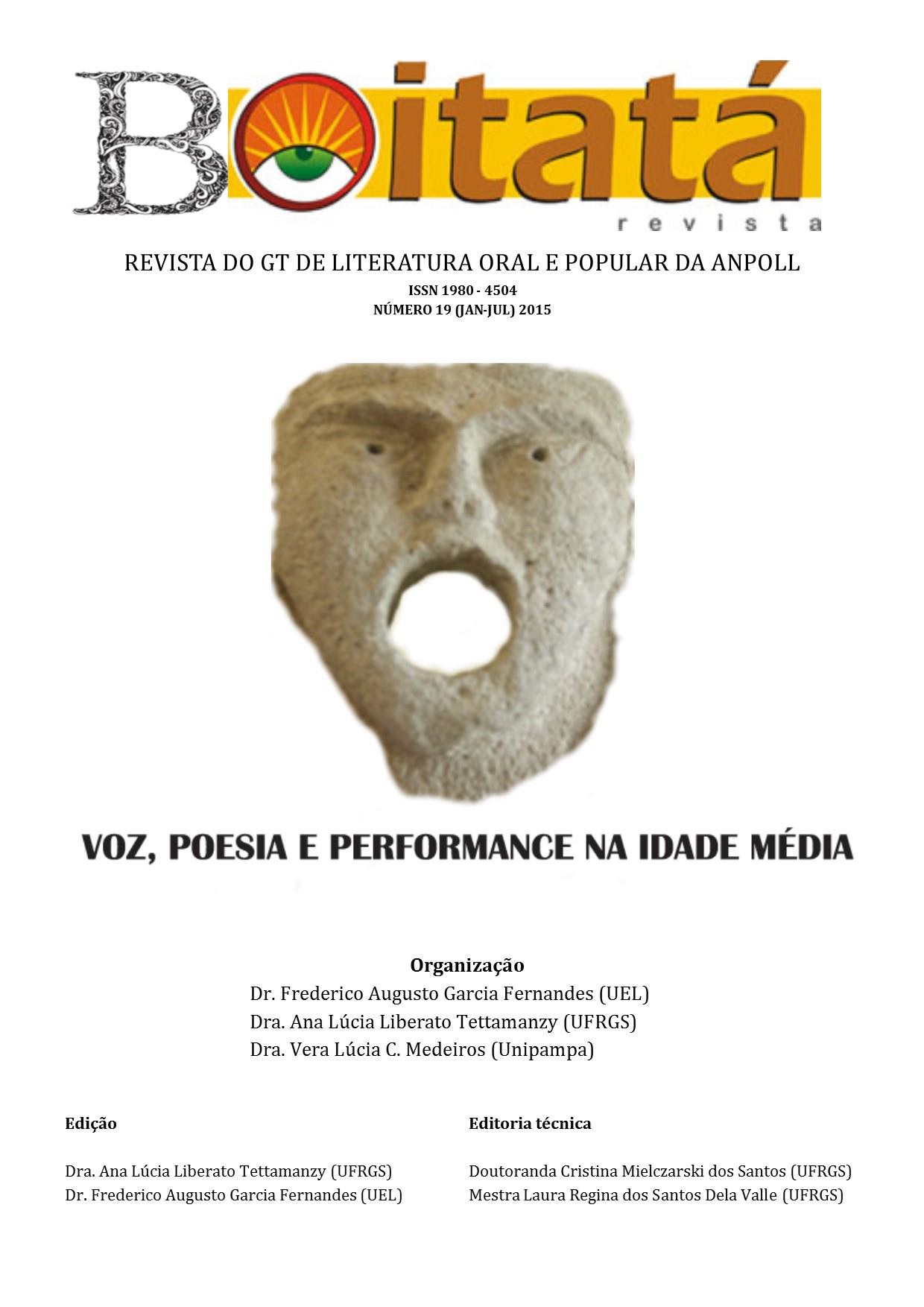For a poethy of daytime; the reception of the tagelied in the lyrics of modern love
DOI:
https://doi.org/10.5433/boitata.2015v10.e31508Keywords:
Tagelied, Lyric love poetry, Mouvance, IntertextualityAbstract
Theoretically based on the studies of the medievalist Paul Zumthor, mainly focusing on the concepts of mouvance and intertextuality, this paper aims to present a comparative analysis of a Tagelied by Heinrich von Morungen and two modern reinterpretations, the first by Mascha Kaléko and the second by Karin Kiwus, taking into account the reiteration and updating of theme and motif.References
COCALIS, Susan L. (Org.). The defiant Muse: German Feminist Poems from the Middle Ages to the Present. A Bilingual Anthology. New York: CUNY Feminist Press, 1986.
ELM, Theo. Lyrik heute. In: HINDERER, Walther (Org.). Geschichte der deutschen Lyrik vom Mittelalter bis zur Gegenwart. 3. ed. Würzburg: Königshausen und Neumann, 2010, p. 605-620.
FERREIRA, Jerusa Pires. Cavalaria em cordel: o passo das águas mortas. 2. ed. São Paulo: Hucitec, 1993.
GOHEEN, Jutta. Zeit und Zeitlichkeit im mittelhochdeutschen Tagelied. In: DIETRICK, Linda; JOHN, David G. (Org.). Momentum dramaticum. Festschrift for Eckhard Catholy. Waterloo: University of Waterloo Press, 1990, p. 41-53.
GORDON, Sarah. Intertextuality and Comparative Approaches in Medieval Literature. In: CLASSEN, Albrecht (ed.) Handbook of medieval studies: terms, methods, trends. Berlin, New York: Walter de Gruyter, 2010, p. 716-726.
HÄRLE, Gerhard. Lyrik, Liebe, Leidenschaft. Motivgeschichtlicher Streifzug durch die Liebeslyrik von Sappho bis Sarah Kirsch. Darmstadt: WGB, 2007.
HEINRICH VON MORUNGEN. Owê, sol aber mir iemer mê. In: MOSER, Hugo; TERVOOREN, Helmut (Org.). Des Minnesangs Frühling. Stuttgart: S. Hirtzel, 1988, p. 276-277.
HILDESHEIMER, Wolfgang. Enttäuschung einkalkuliert. In: REICH-RANICKI, Marcel (Org.). 1400 Deutsche Gedichte und ihre Interpretation: Von Rolf Dieter Brinkmann bis Durs Grünbein. v. 12. Frankfurt am Main: Insel Verlag, 2002, p. 75-78.
KALÉKO, Mascha. Der nächste Morgen. In: KALÉKO, Mascha. Das lyrische Stenogramm. Hamburg: Rowohlt, 2001, p. 27.
KIWUS, Karin. Im ersten Licht. In: KIWUS, Karin. Von beiden Seiten der Gegenwart. Gedichte. Frankfurt am Main: Suhrkamp, 1976, p. 46.
KORTE, Hermann. Brechungen und Wenden. Lyrik der siebziger und achtziger Jahre. In: KORTE, Hermann, et al. (Org.). Geschichte der deutschen Lyrik. Stuttgart: Reclam, 2004, p. 627- 652.
LEEDER, Karen. Modern german poetry. In: KOLINSKY, Eva; VAN DER WILLL, Wilfried (Org.). The Cambridge Companion to Modern German Culture. New York: Cambridge University Press, 1998, p. 193-212.
LEXER, Mathias. Mittelhochdeutsches Taschenwörterbuch. 3. ed. Stuttgart: Hirzel, 1992.
NUSSER, Peter. Deutsche Literatur im Mittelalter: Lebensformen, Wertvorstellungen und literarische Entwicklungen. Stuttgart: Kröner, 1992.
POLENZ, Peter von. História da língua alemã. Tradução de Jaime Ferreira da Silva, António Almeida. Lisboa: Fundação Calouste Gulbenkian, 1973.
ROSENSTEIN, Roy. Mouvance. In: CLASSEN, Albrecht (Ed.) Handbook of medieval studies: terms, methods, trends. Berlin, New York: Walter de Gruyter, 2010, p. 1538-1547.
RUH, Kurt. Das Tagelied Heinrichs von Morungen. In: RUH, Kurt. Kleine Schriften. Berlin, New York: Walter de Gruyter, 1984, p. 103-106.
SCHIEWER, Hans-Jochen. Tagelied. In: Lexikon des Mittelalters. Vl. VIII. München: DTV, 2003, p. 427-428.
TAUBERT, Gesine. Mittelochdeutsche Kurzgrammatik mit Verslehre. Erding: Herben, 1995.
WAPNEWSKI, Peter. Deutsche Literatur des Mittelalters: ein Abriss von den Anfängen bis zum Ende der Blütezeit. 5. ed. Göttingen: Vandenhoeck und Ruprecht, 1990
WAPNEWSKI, Peter. Morungens Tagelied. In: Annali dell'Istituto Universitario Oricntale di Napoli, Sezione Germanica, IV, 1961, p. 1-10.
WEDDIGE, Hilkert. Einführung in die germanistische Mediävistik. 5. ed. München: C. H. Beck, 2003.
ZUMTHOR, Paul. A letra e a voz: a “literatura” medieval. Tradução de Amálio Pinheiro, Jerusa Pires Ferreira. São Paulo: Companhia das Letras, 1993.
ZUMTHOR, Paul. Escritura e Nomadismo: entrevistas e ensaios. Tradução de Jerusa Pires Ferreira, Sonia Queiroz. Cotia, SP: Ateliê Editorial, 2005.
ZUMTHOR, Paul. Essai de poétique médiévale. Paris: Éditions du Seil, 1972.
Downloads
Published
How to Cite
Issue
Section
License
Copyright (c) 2015 Boitatá

This work is licensed under a Creative Commons Attribution 4.0 International License.
Boitatá esta licenciada com CC BY sob essa licença é possível: Compartilhar - copiar e redistribuir o material em qualquer suporte ou formato. Adaptar - remixar, transformar, e criar a partir do material, atribuindo o devido crédito e prover um link para a licença e indicar se mudanças foram feitas.




















